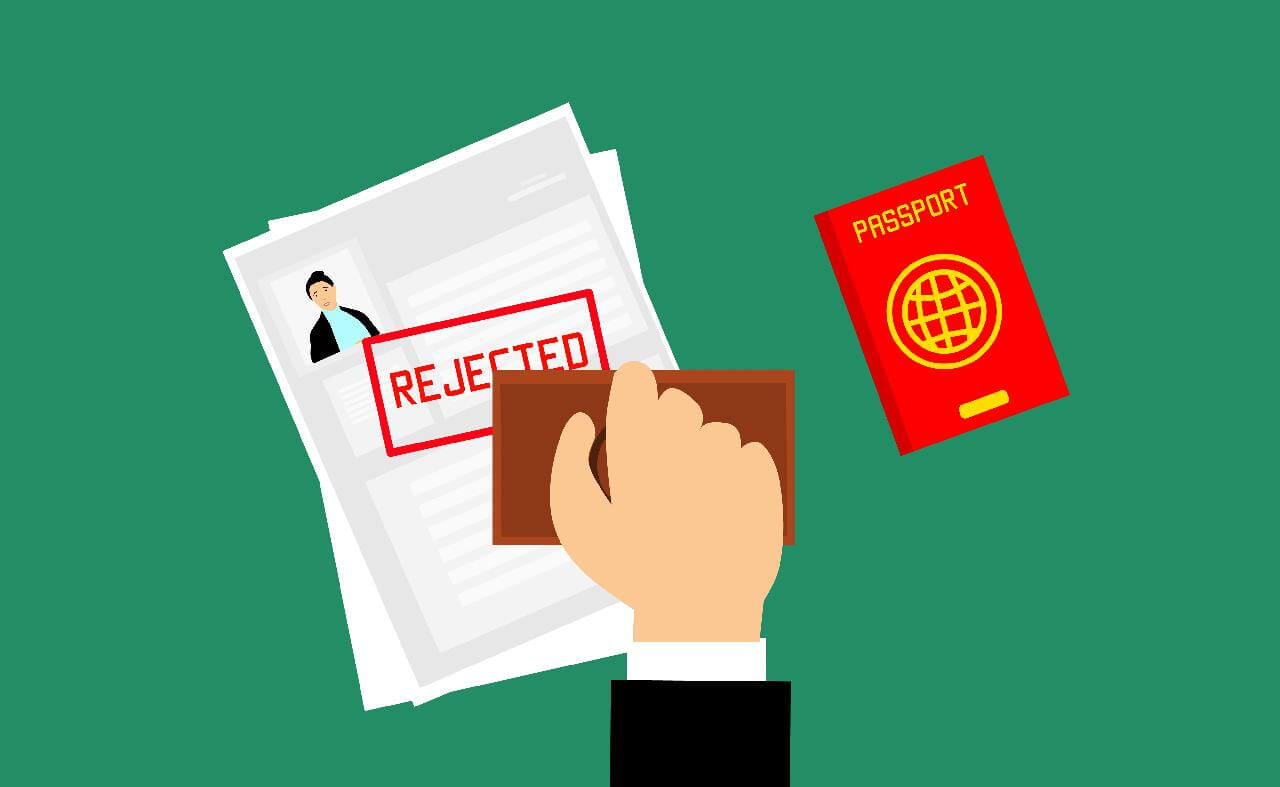The Common Reasons for Visa Application Rejection and How to Avoid Them
The Common Reasons for Visa Application Rejection and How to Avoid Them


7 Ağu 2023
7 Ağu 2023
As you prepare for your European adventure, the Schengen visa stands as the key to unlock many of these countries. However, acquiring this visa isn't always straightforward. With rejection rates higher than one might expect, it's crucial to arm yourself with the right information. This guide will walk you through the nuances of the Schengen visa process, ensuring you're well-prepared for a successful application.
How to Apply for a Schengen Visa from the UK
Applying for a Schengen visa from the UK involves a systematic procedure that applicants must follow. Here’s a step-by-step guide to help you navigate the process:
Determine Your Schengen Destination
Complete the Schengen Visa Application Form:
Book an appointment.
Gather Required Documents (more about documents here)
Valid passport
Recent passport-sized photographs
Travel insurance policy with coverage of at least €30,000
Flight itinerary
Accommodation details (hotel bookings or invitation from host)
Proof of financial sufficiency (bank statements, payslips)
Any other documents specific to your visa type (e.g., invitation letter for business visas)
Book an Appointment:
Schedule an appointment at the consulate or embassy of your main Schengen destination or at a visa application centre. Services like Bot Visard simplify this step by notifying you of available time slots on visa centre websites, offering an easier and more cost-effective solution than traditional Schengen visa agencies in the UK and London.
Pay the Visa Fee.
Await the Decision:
Once you’ve submitted your application, it will be processed. This can take up to 15 calendar days, but it might take longer during peak seasons. It's advisable to apply well in advance of your planned departure date.
Collect Your Passport.
Remember, while the process is standardized, specific requirements might vary slightly depending on the Schengen country you're applying to. Always refer to the official consulate or embassy website for the most accurate and up-to-date information.

Common Reasons for Schengen Visa Rejections
Obtaining the Schengen visa is not always as straightforward as it might seem. While it provides an unparalleled opportunity to explore the heart of Europe, applicants often face challenges. A clear understanding of the common reasons for visa denials can empower you to address potential issues proactively.
1. Incomplete Documentation
The backbone of any visa application is its documentation. Filling out the Schengen visa application form demands attention to every detail. Sometimes, essential documents like accommodation bookings, travel itinerary, or even flight tickets might be overlooked. Additionally, applicants might sometimes mistakenly provide outdated forms or disregard the need for translations of non-English documents, leading to potential rejections. Here you can find the list of common needed documents.
2. Insufficient Travel Insurance Coverage
Europe’s emphasis on the safety and well-being of its visitors is reflected in its strict requirements for travel insurance. A travel insurance policy document should verify that you have coverage for medical emergencies and repatriation up to €30,000, valid across all Schengen countries, and for your entire stay or transit period.
3. Invalid Purpose of Visit
A clear intent for your European journey is vital. While "vacation" or "sightseeing" might seem like adequate explanations, visa officers prefer more detailed descriptions. For instance, if your primary aim is to attend a business conference in Berlin but also plan to explore the Alps in Switzerland, it's essential to articulate both aspects clearly.
4. Doubtful Means of Subsistence
Being a traveler requires financial means to support oneself. The Schengen area, known for its high living standards, expects its visitors to substantiate their financial stability. A mere bank statement might not suffice. Regular income proofs, like salary slips, property documents, or even a detailed sponsorship letter if someone else is bearing your expenses, can solidify your application.
5. Past or Current Criminal Record
Everyone deserves a second chance. However, visa officers have to ensure the safety of their citizens. If you've had legal altercations in the past, it becomes imperative to provide context. For instance, traffic violations might be viewed differently from more severe offenses. It's beneficial to be transparent and, if applicable, demonstrate your commitment to better choices.
6. Overstay during Previous Visits
Staying beyond the permitted duration during a previous visit can be a significant concern for visa officers. Such actions might be perceived as a disregard for visa guidelines, leading officials to question the integrity of a new application. It's crucial to respect visa durations and, if there were genuine reasons for past overstays, to explain them sincerely.
Tips to Avoid Common Rejection Reasons
Having delved into the common reasons for visa denials, it's essential to arm oneself with strategies to navigate these challenges.
1. Double-Check All Documentation
The importance of thorough documentation cannot be emphasized enough. Before submission, go over every document, cross-referencing with official guidelines. Tools like online checklists or even services provided by agencies like the Schengen visa application agency London can be invaluable.
2. Invest in Good Travel Insurance
Beyond just meeting visa requirements, a robust travel insurance policy can be a lifesaver. Don't rush this step. Invest time in comparing policies, ensuring they cover medical emergencies, unexpected trip disruptions, and even potential evacuations.
3. Clearly State Your Purpose of Visit
Precision is your best friend. When detailing your travel purpose, be as explicit as possible. Whether it's a cultural exploration, a business venture, or a family reunion, provide supporting documents like event passes, business invites, or personal invitation letters.
4. Provide Transparent Financial Records
Financial stability is not just about having funds but about demonstrating responsible financial behavior. Consistent bank records, stable employment history, and even previous travel records can bolster your profile. If someone else is financing your trip, their credentials become equally important.
5. Be Honest About Your History
Candor is appreciated. Whether it's past visa issues, overstays, or legal challenges, being upfront can be beneficial. Instead of allowing visa officers to make assumptions, provide a comprehensive picture, highlighting lessons learned and the steps taken to rectify past mistakes.

The Schengen visa is more than just a document; it's an opportunity to explore a continent's worth of experiences with ease. By understanding common pitfalls and preparing meticulously, you can significantly enhance your chances of approval.
Sources: Schengen Visa Info
Written by Natalia Kondratyeva
As you prepare for your European adventure, the Schengen visa stands as the key to unlock many of these countries. However, acquiring this visa isn't always straightforward. With rejection rates higher than one might expect, it's crucial to arm yourself with the right information. This guide will walk you through the nuances of the Schengen visa process, ensuring you're well-prepared for a successful application.
How to Apply for a Schengen Visa from the UK
Applying for a Schengen visa from the UK involves a systematic procedure that applicants must follow. Here’s a step-by-step guide to help you navigate the process:
Determine Your Schengen Destination
Complete the Schengen Visa Application Form:
Book an appointment.
Gather Required Documents (more about documents here)
Valid passport
Recent passport-sized photographs
Travel insurance policy with coverage of at least €30,000
Flight itinerary
Accommodation details (hotel bookings or invitation from host)
Proof of financial sufficiency (bank statements, payslips)
Any other documents specific to your visa type (e.g., invitation letter for business visas)
Book an Appointment:
Schedule an appointment at the consulate or embassy of your main Schengen destination or at a visa application centre. Services like Bot Visard simplify this step by notifying you of available time slots on visa centre websites, offering an easier and more cost-effective solution than traditional Schengen visa agencies in the UK and London.
Pay the Visa Fee.
Await the Decision:
Once you’ve submitted your application, it will be processed. This can take up to 15 calendar days, but it might take longer during peak seasons. It's advisable to apply well in advance of your planned departure date.
Collect Your Passport.
Remember, while the process is standardized, specific requirements might vary slightly depending on the Schengen country you're applying to. Always refer to the official consulate or embassy website for the most accurate and up-to-date information.

Common Reasons for Schengen Visa Rejections
Obtaining the Schengen visa is not always as straightforward as it might seem. While it provides an unparalleled opportunity to explore the heart of Europe, applicants often face challenges. A clear understanding of the common reasons for visa denials can empower you to address potential issues proactively.
1. Incomplete Documentation
The backbone of any visa application is its documentation. Filling out the Schengen visa application form demands attention to every detail. Sometimes, essential documents like accommodation bookings, travel itinerary, or even flight tickets might be overlooked. Additionally, applicants might sometimes mistakenly provide outdated forms or disregard the need for translations of non-English documents, leading to potential rejections. Here you can find the list of common needed documents.
2. Insufficient Travel Insurance Coverage
Europe’s emphasis on the safety and well-being of its visitors is reflected in its strict requirements for travel insurance. A travel insurance policy document should verify that you have coverage for medical emergencies and repatriation up to €30,000, valid across all Schengen countries, and for your entire stay or transit period.
3. Invalid Purpose of Visit
A clear intent for your European journey is vital. While "vacation" or "sightseeing" might seem like adequate explanations, visa officers prefer more detailed descriptions. For instance, if your primary aim is to attend a business conference in Berlin but also plan to explore the Alps in Switzerland, it's essential to articulate both aspects clearly.
4. Doubtful Means of Subsistence
Being a traveler requires financial means to support oneself. The Schengen area, known for its high living standards, expects its visitors to substantiate their financial stability. A mere bank statement might not suffice. Regular income proofs, like salary slips, property documents, or even a detailed sponsorship letter if someone else is bearing your expenses, can solidify your application.
5. Past or Current Criminal Record
Everyone deserves a second chance. However, visa officers have to ensure the safety of their citizens. If you've had legal altercations in the past, it becomes imperative to provide context. For instance, traffic violations might be viewed differently from more severe offenses. It's beneficial to be transparent and, if applicable, demonstrate your commitment to better choices.
6. Overstay during Previous Visits
Staying beyond the permitted duration during a previous visit can be a significant concern for visa officers. Such actions might be perceived as a disregard for visa guidelines, leading officials to question the integrity of a new application. It's crucial to respect visa durations and, if there were genuine reasons for past overstays, to explain them sincerely.
Tips to Avoid Common Rejection Reasons
Having delved into the common reasons for visa denials, it's essential to arm oneself with strategies to navigate these challenges.
1. Double-Check All Documentation
The importance of thorough documentation cannot be emphasized enough. Before submission, go over every document, cross-referencing with official guidelines. Tools like online checklists or even services provided by agencies like the Schengen visa application agency London can be invaluable.
2. Invest in Good Travel Insurance
Beyond just meeting visa requirements, a robust travel insurance policy can be a lifesaver. Don't rush this step. Invest time in comparing policies, ensuring they cover medical emergencies, unexpected trip disruptions, and even potential evacuations.
3. Clearly State Your Purpose of Visit
Precision is your best friend. When detailing your travel purpose, be as explicit as possible. Whether it's a cultural exploration, a business venture, or a family reunion, provide supporting documents like event passes, business invites, or personal invitation letters.
4. Provide Transparent Financial Records
Financial stability is not just about having funds but about demonstrating responsible financial behavior. Consistent bank records, stable employment history, and even previous travel records can bolster your profile. If someone else is financing your trip, their credentials become equally important.
5. Be Honest About Your History
Candor is appreciated. Whether it's past visa issues, overstays, or legal challenges, being upfront can be beneficial. Instead of allowing visa officers to make assumptions, provide a comprehensive picture, highlighting lessons learned and the steps taken to rectify past mistakes.

The Schengen visa is more than just a document; it's an opportunity to explore a continent's worth of experiences with ease. By understanding common pitfalls and preparing meticulously, you can significantly enhance your chances of approval.
Sources: Schengen Visa Info
Written by Natalia Kondratyeva
Related posts



Schengen Visa for Slovakia | Book Slovak Visa Appointment in the UK



Schengen Visa for Poland | Book Polish Visa Appointment in the UK



Schengen Visa for Greece | Book Greek Visa Appointment in the UK



Schengen Visa for Bulgaria | Book Bulgarian Visa Appointment in the UK



Schengen Visa for Sweden | Book Swedish Visa Appointment in the UK



Schengen Visa for Latvia | Book Latvian Visa Appointment in the UK



Schengen Visa for Slovenia | Book Slovenian Visa Appointment in the UK



Schengen Visa for Cyprus | Book Cypriot Visa Appointment in the UK



Schengen Visa for Lithuania | Book Lithuanian Visa Appointment in the UK



Schengen Visa for Estonia | Book Estonian Visa Appointment in the UK
Related posts
Related posts